- Home
- Diana Palmer
Undaunted Page 4
Undaunted Read online
Page 4
“It’s true,” Barnes said, smiling. His eyes twinkled. “He’s a terrible boss,” he added suddenly. “You should see him when he loses his temper.”
“Shut up while you still have a job,” Connor muttered, but his eyes were twinkling, too. He waved a hand. “Go build something.”
Barnes winked at Emma and left, grinning.
Connor chuckled. “He weaves baskets as a hobby. He picks up vines out of the woods and twists them into all sorts of shapes. There’s one of his on a side table. Over there, I think.” He indicated an elegant-looking basket on a side table.
“It’s really beautiful,” she said, surprised. Her knowledge of baskets was scanty, but that one looked professional.
“He could make a living with them if he wanted to,” he said. “He has his own website. He sells to designers all across the country.” He shook his head. “When he makes his first million, I’ll have to have a stranger drive me everywhere.” He raised his voice. “I’ll probably be killed in a horrible wreck!”
“I will never make millions!” Barnes called back. “And if I do, I’ll still drive you!”
“Okay,” Connor called back. His sightless eyes were twinkling. Barnes threw up a hand and went out the back door.
“He drove me mad at first. But I tend to get moody. I don’t like strangers in my house, as a rule.”
She fingered her empty coffee cup and remained quiet.
“I didn’t mean you, if that’s what the silence is about,” he mused.
She laughed softly. “Okay.”
He looked in the direction of her voice. “Well? Are you pouring coffee or meditating on it?” he chided.
“I, well, I wasn’t sure if you said grace or...”
“Grace?”
Her eyes widened at the venom in his tone.
His pale eyes glittered with bad humor. “I’m not much on religion. Just pour the coffee. And if you want to say grace, say it silently, please,” he added curtly.
She didn’t know what else to do. She nodded. Then she realized that he couldn’t see her, and guilt washed over her like a wave.
“Well?” he prompted, his tone cutting.
“Sorry. Coffee?”
“Obviously I want coffee. Hence the empty mug right here.” He fumbled for it and rattled it.
“You are a very unpleasant man!” she pointed out.
“And I work hard at it, too.”
She grimaced as she poured his coffee.
He reached for it, managed it on the second try and lifted it to his mouth. “I want bacon and eggs. No pancakes.”
She got up and ladled them onto a plate. She put the plate down in front of him, caught his big hand and put a fork in it. “Bacon at three o’clock, eggs at nine o’clock. Buttered toast?” she added.
“I don’t eat much bread.” He dug into his breakfast, downed a swallow of eggs and coffee and put the cup down. “How did you learn to do that?” he asked.
“What?”
“The positions on the plate.”
“Oh. We had a blind lady who went to our church. I used to sit with her when we had picnics. She taught me. That was how she managed her food. She was eighty-six and she could ride a bike and play the piano. I was very fond of her.”
He finished eating, then leaned back with a sigh and pursed his lips. “Did she teach you anything else about blind people?”
“That you never grab them. It disconcerts them.” She told him about the guide dog the woman had, and her determination to learn Braille.
He was smiling faintly. “You learned a lot.”
“I listened,” she said simply. “People mostly don’t listen. They want to tell you about themselves, they want to discuss the latest vote on the reality shows and the latest fashions.” She sighed. “I never cared about those things. I don’t watch much television.”
“I listen to the news. I don’t follow anything except the stock market.”
There was a brief, companionable silence while she finished her coffee.
“You said you were in between jobs.”
“Just briefly. I’m going to put my name down with one of the temporary agencies in Gainesville...”
“Come work for me.”
She almost dropped the cup. “What?”
“Come work for me,” he repeated. “I have secretaries in all my corporate offices, but I don’t have a private secretary. Administrative assistant. Whatever the hell you call it. Someone to take dictation, answer the phone, make appointments and see to it that I keep them. Things like that. I used to have the Atlanta office send someone up, but I don’t want my condition to get around.”
She knew what he meant. Any bad news about his health would probably drop stock prices. People gossiped.
So he was offering her a job. She didn’t dare. She couldn’t. But she wanted to. “For how long?” she asked breathlessly.
“We’ll give it a month’s probation to see if we suit each other. How about that?” he asked, and his face tensed, as if her reply really mattered.
She smiled. A man like him wouldn’t care whether she said yes or no. It would be insane to agree. If he ever found out who she was, if he ever recognized her voice...
On the other hand, she could help him, take care of him, try to make up for what she’d done to him. It pained her to realize the price he’d paid for her stupidity. If only she’d never gotten behind the wheel of the stupid boat, if only she’d looked where she was going!
“Well?” he prompted curtly.
“I...I would like to,” she heard herself saying with absolute horror. It was nuts!
His face relaxed. He drew in a breath. “Fine. You’ll live in. Marie can show you to a bedroom later and help you get settled.” He named a salary that was six times what Mamie paid her.
She blanched. Her gasp was audible.
“Not enough?” he chided.
“Not enough?” she burst out. “I don’t make that much in a year!”
“You’ll earn it,” he said, and his pale eyes twinkled faintly. “I’m a difficult man, Emma. You may wish you’d said no.”
“If you get too troublesome, I’ll push you headfirst into the lake and use my alligator whistle.”
He thought for a minute, and then burst out laughing. “If you can find an alligator in any North Georgia lake, I’ll double your salary,” he mused. “All right. We’ll give it a month.”
* * *
The first few days were hectic. There was a learning curve, because he wasn’t as flighty as some of her bosses had been. He was studious, methodical, exacting and sometimes maddening. He wanted files in a certain order. He wanted letters done exactly as he said, even if they weren’t always polite. He wanted routine in everything. Emma found it exasperating.
“You’re making that sound again,” he said curtly from his desk. “Now what?”
“I feel like I need to ask permission to change my clothes,” she muttered. “Organization. Heavens! I’ve never been able to organize anything in my life. I’m too scatterbrained.”
“You’ll learn. You can pretend you’re in the military.”
“I’m not going on military time, and I’m not saluting you,” she shot back.
He chuckled. “Okay.”
“You’ve got two thousand unanswered emails,” she added.
“Go through them and delete the ads. That should get rid of ninety percent.”
“I need a program that does that automatically,” she murmured.
“Then go online and download one,” he said.
She almost sighed again, but he was looking surly this morning. “Yes, sir,” she said instead.
“How sweet that sounds,” he snarled.
“Sweet like vinegar, sir, the
better to douse you with,” she muttered.
He chuckled.
The phone rang and she answered it.
It was a woman. She asked for Connor. Emma had no idea who the woman actually was; she just handed the phone to Connor and went back to work.
There was a terse conversation. It ended with a short curse and the phone being slammed down on the desk.
“Don’t ever put that woman through again, do you understand me, Emma?” he snapped.
“Yes, sir!” she said at once, reddening.
He ran a hand through his hair. “Damn women everywhere!” he cursed. “I gave her a mink and a Ferrari and a diamond the size of a hen egg, and she can’t understand that it was to get her out of my hair!”
“Poor man, stalked by women, not safe even in his own home,” Emma mused. “Perhaps we should build a fence.”
“Damn it!” he exploded. He stood up, his eyes blazing, furious. “Do you think I’m kidding?”
She drew in her breath. He looked formidable when he lost his temper. She sat quietly, waiting for the rest of the explosion.
“She wants to make up,” he snarled. “Which means she wants more presents from me, and she’s willing to do anything, absolutely anything, to get back into my life. I would rather feed myself to a shark!”
She wanted so badly to invite him to, but that way lay disaster. She just sat still, like a statue.
“I don’t want marriage. I don’t want a family. I’m happy with my life just the way it is. She said that I needed a son to inherit what I’ve got. A son.” He slammed his fist down on the desk and Emma jumped. “What she meant was that she wanted to get pregnant with my child and have me support her for the next eighteen years! No damned way!”
She didn’t say a word.
“I’ve always been careful,” he said through his teeth. “Always prepared. They said they were using birth control, but I never believed it. All my adult life, I’ve dodged women trying to trap me into marriage. All I wanted was brief affairs. They wanted forever. There is no forever!” he ground out. “Only damned fools believe there is!”
She was almost shivering now. The force of his rage was intimidating, even when he was sightless.
“And you put her through,” he added, looking toward where he thought she might be. “You put her right through to me without asking if I wanted to talk to her. By God, you do that again, and I’ll throw you out on the front lawn in your damned nightgown!”
She fought back tears.
“Do you understand? Talk to me!”
“I understand, Mr. Sinclair,” she said shakily.
“Good!”
She tried to type, but her hands were shaking too hard.
“Get me some coffee,” he snapped.
“Yes, sir.” She got up from her chair, still wobbly. Her voice had sounded shaky.
“Emma!”
She stopped. “Yes, s-sir?” she stammered.
He hesitated. Frowned. “Emma, come here,” he said in a tone like velvet, soft and gentle. “Come on.”
She went to him slowly, disturbed and shivering.
He felt for her shoulder and pulled her suddenly right into his arms, folding her close to that warm, magnificent strength. She laid her cheek against his chest and the tears stained the fabric.
“You’re crying,” he chided. “Come on, Emma, I’m not an ogre.”
“Yes, you are,” she said through tears. “You’re scary like one.”
“So people tell me.” He kissed her hair. She made him feel guilty. It had been ages since a woman had accomplished that. “Come on. Stop crying. I won’t yell anymore.”
“I didn’t know who she was,” she sobbed.
He held her closer, burying his face in her throat, petting the soft, long hair that ran down her shoulders. Then his big hands smoothed gently along her spine. “I didn’t realize that.” His mouth moved on her neck.
She gasped. Her heart raced. This close to him, she was feeling odd sensations, ripples of pleasure that she’d never experienced, not even with Steven. This man had a sensual magnetism that was uniquely his.
“You like this,” he teased.
“Mr. Sinclair...” she protested.
He laughed, deep in his throat.
“I have to go...”
His cheek slid against hers. “Do you?” he whispered as his mouth moved close to hers, hovered over it.
“I should...” she choked.
“Should you?” he whispered.
She didn’t know what to do. There had only been Steven in her life, and he’d barely touched her. Theirs had been a cerebral sort of relationship until he found out what her father did for a living and dumped her. She had no experience at all with the sort of flirting Connor was subjecting her to. She stiffened in his arms.
He drew back, his eyes narrowed. He wished that he could see her face. Her young body was stiff as a board. But her breath was fluttering at his collarbone. He could feel her heart beating like a butterfly. She was attracted to him. Very attracted, by the feel of her. But she was also frightened.
He frowned. “What are you afraid of, Emma?” he whispered.
Both her hands pressed against his broad chest, feeling the hard, warm muscle under his shirt. “Please,” she faltered.
He let her go. He didn’t seem to be angry anymore. He looked more puzzled than anything else.
She almost ran out of the room. But she didn’t. She stood her ground. And went back to her desk.
Three
Emma took dictation on a letter he was writing to his attorney. She was barely aware of what she was writing down. It had upset her, that blatant, unbridled anger. But what had followed it had upset her even more.
She was vulnerable with him. It was surprising, because he was so much older than she was, almost a generation. But when he touched her, the years fell away. She felt far different with him than she’d ever felt with Steven, and it scared her.
She tried to tell herself that he was just very experienced with women. That was what it was. But there had to be an attraction in the first place. He’d been amused by her reactions, but then he’d gone silent. He was still silent, in between dictation. He was frowning, as if he was worrying a puzzle in his mind.
“Read that back,” he said when he finished dictating.
She read the letter to him.
He drew in an irritated breath and ran a restless hand through his thick, wavy hair. “I hate not being able to read my own damned letters,” he muttered.
“It will get easier as you go along,” she said quietly.
His head lifted and turned, as if he was trying to see where she was. “Do you think so?” he asked with a rough laugh. “I very much doubt it.”
“We all have trials in life,” she said simply. “We get through them. Everything passes away—grief, anger, hope, joy, all of it. It’s both a blessing and a curse.”
“What have you gotten through? Are you even old enough to have had trials at all?”
She started to tell him about her father, then quickly bit her tongue. There were going to be pitfalls, working for him. Here was one of the biggest. She remembered telling him, when he was sighted, about Dolores, and her father, and the boy who’d broken their engagement when he found out her father ran beef cattle.
“We all have trials,” she replied.
“How old are you?” he asked suddenly.
She knew she’d never told him that. She doubted that Mamie had, or that he would have bothered to ask. “I’m twenty-three,” she said softly.
“Twenty-three.” His face was impassive. His eyes were narrow. His lips compressed. “Twenty-three.”
She couldn’t see into his mind or she might have been surprised at why he reacted
that way to her age. He was seeing doors closing. She was twenty-three. He was thirty-eight. Her life was beginning. He was approaching the middle of his. Even if he’d been interested—and he was—her age put him off.
He leaned back in his chair and drew in a long breath. “My brother died on this lake,” he said abruptly.
“Your brother?”
“He and his wife were on a houseboat. There was a party. It was late on a Friday night. A couple of teenagers in a motorboat came flying around one of the coves and hit it broadside. My brother and his wife drowned in the time it took rescue people to get here and start looking for them.”
“I’m so sorry,” she said as she understood, too well, too late, his overreaction to her speeding in Mamie’s boat.
“He was the last living relative I had,” he replied. “We were close.” He glanced her way. “Do you have family, Emma?”
She hesitated. “Yes. My father lives on a small farm in North Carolina.” There was no reason for him to check that out, after all.
“Are you close?”
“Not so much. He’s very independent. But my mother and I were. She was very sweet and gentle.”
“How did she die?”
She swallowed. “She died in childbirth.”
A shadow passed over his broad face. “Unusual, isn’t it, in this day and age? Any decent obstetrician should be able to call in specialists if there are problems.”
“She was in labor for a long time and she had a hidden heart condition. She died of a heart attack.”
“I see. And the child?”
“A little girl. She was stillborn. They said she’d been dead for several days. They couldn’t save her.” That wasn’t the whole truth. She wasn’t telling him that her father had let her mother lie in childbirth for two horrible days, or that she’d died, ironically, while he was delivering a calf out in the pasture several miles from the house. By the time he finally got home to a sobbing Emma and a still, cold wife, it was too late to save her.
Emma’s father had delivered Emma at home, and he’d planned to do the same with his second child. Apparently it had never occurred to him that he should have taken his wife to the hospital when she started complaining of chest pain. She’d had an undiagnosed heart condition that the stress of prolonged childbirth had caused to go critical. She’d died of a massive coronary.

 A Cattleman's Honor
A Cattleman's Honor For Now and Forever
For Now and Forever Texas Proud and Circle of Gold
Texas Proud and Circle of Gold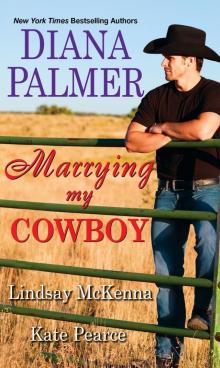 Marrying My Cowboy
Marrying My Cowboy Wyoming Heart
Wyoming Heart Christmas Kisses with My Cowboy
Christmas Kisses with My Cowboy Wyoming True
Wyoming True The Rancher's Wedding
The Rancher's Wedding Mercenary's Woman ; Outlawed!
Mercenary's Woman ; Outlawed! Long, Tall Texans: Stanton ; Long, Tall Texans: Garon
Long, Tall Texans: Stanton ; Long, Tall Texans: Garon Lawless
Lawless Blake
Blake Escapade
Escapade Fire Brand
Fire Brand Cattleman's Choice
Cattleman's Choice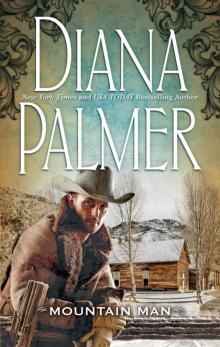 Mountain Man
Mountain Man Long, Tall and Tempted
Long, Tall and Tempted A Love Like This
A Love Like This Miss Greenhorn
Miss Greenhorn Magnolia
Magnolia Lord of the Desert
Lord of the Desert Wyoming Fierce
Wyoming Fierce True Colors
True Colors Calamity Mom
Calamity Mom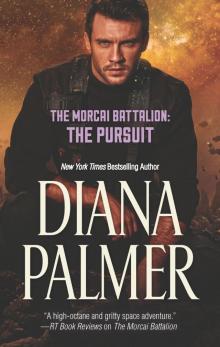 The Pursuit
The Pursuit Rogue Stallion
Rogue Stallion Date with a Cowboy
Date with a Cowboy Heart of Winter
Heart of Winter Friends and Lovers
Friends and Lovers Love on Trial
Love on Trial Boss Man
Boss Man Callaghan's Bride
Callaghan's Bride Before Sunrise
Before Sunrise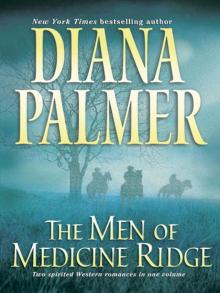 The Men of Medicine Ridge
The Men of Medicine Ridge Texas Proud
Texas Proud Wyoming Tough
Wyoming Tough Passion Flower
Passion Flower Maggie's Dad
Maggie's Dad Donavan
Donavan The Rancher & Heart of Stone
The Rancher & Heart of Stone Long, Tall Texans: Tom
Long, Tall Texans: Tom The Case of the Mesmerizing Boss
The Case of the Mesmerizing Boss Montana Mavericks Weddings
Montana Mavericks Weddings Redbird
Redbird Wyoming Strong
Wyoming Strong Darling Enemy
Darling Enemy Love by Proxy
Love by Proxy Coltrain's Proposal
Coltrain's Proposal The Best Is Yet to Come & Maternity Bride
The Best Is Yet to Come & Maternity Bride Rawhide and Lace
Rawhide and Lace Wyoming Rugged
Wyoming Rugged Patient Nurse
Patient Nurse Undaunted
Undaunted Long Tall Texans Series Book 13 - Redbird
Long Tall Texans Series Book 13 - Redbird Outsider
Outsider Long, Tall Texans: Drew
Long, Tall Texans: Drew Long, Tall Texans--Christopher
Long, Tall Texans--Christopher Merciless
Merciless A Match Made Under the Mistletoe
A Match Made Under the Mistletoe Evan
Evan Hunter
Hunter Now and Forever
Now and Forever Hard to Handle
Hard to Handle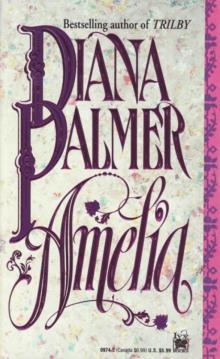 Amelia
Amelia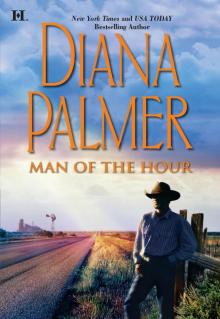 Man of the Hour
Man of the Hour Invincible
Invincible The Maverick
The Maverick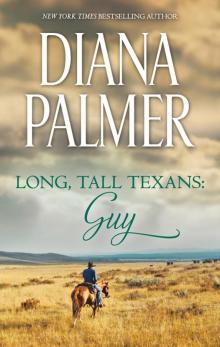 Long, Tall Texans--Guy
Long, Tall Texans--Guy Noelle
Noelle Enamored
Enamored The Best Is Yet to Come
The Best Is Yet to Come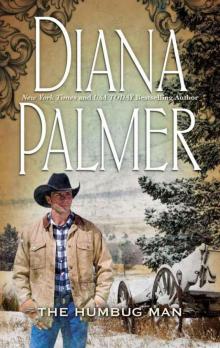 The Humbug Man
The Humbug Man Wyoming Brave
Wyoming Brave Calhoun
Calhoun Long, Tall Texans--Harden
Long, Tall Texans--Harden The Reluctant Father
The Reluctant Father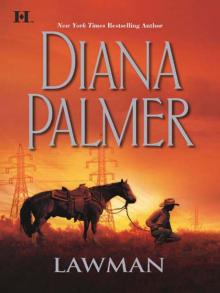 Lawman
Lawman Long, Tall Texans: Hank & Ultimate Cowboy ; Long, Tall Texans: Hank
Long, Tall Texans: Hank & Ultimate Cowboy ; Long, Tall Texans: Hank Grant
Grant Nelson's Brand
Nelson's Brand Wyoming Legend
Wyoming Legend Diamond Spur
Diamond Spur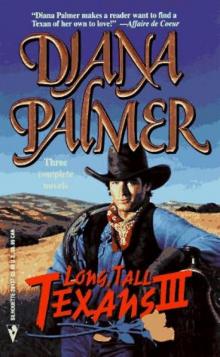 That Burke Man
That Burke Man Wyoming Bold (Mills & Boon M&B)
Wyoming Bold (Mills & Boon M&B) Heartless
Heartless Long, Tall Texans--Luke
Long, Tall Texans--Luke To Have and to Hold
To Have and to Hold Once in Paris
Once in Paris A Husband for Christmas: Snow KissesLionhearted
A Husband for Christmas: Snow KissesLionhearted Night Fever
Night Fever Beloved
Beloved The Australian
The Australian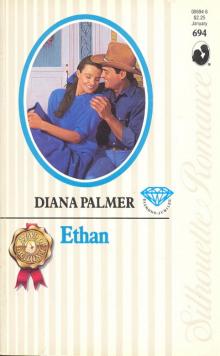 Ethan
Ethan Long, Tall Texans: Jobe
Long, Tall Texans: Jobe Bound by Honor: Mercenary's WomanThe Winter Soldier
Bound by Honor: Mercenary's WomanThe Winter Soldier Tender Stranger
Tender Stranger After Midnight
After Midnight September Morning
September Morning To Wear His Ring
To Wear His Ring Heartbreaker
Heartbreaker Will of Steel
Will of Steel Dangerous
Dangerous Fit for a King
Fit for a King Diamond in the Rough
Diamond in the Rough Matt Caldwell: Texas Tycoon
Matt Caldwell: Texas Tycoon Iron Cowboy
Iron Cowboy Fire And Ice
Fire And Ice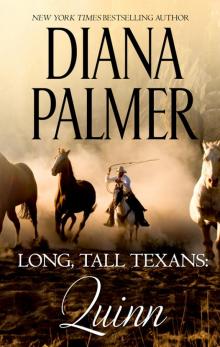 Long, Tall Texans--Quinn--A Single Dad Western Romance
Long, Tall Texans--Quinn--A Single Dad Western Romance Montana Mavericks, Books 1-4
Montana Mavericks, Books 1-4 Denim and Lace
Denim and Lace Eye of the Tiger
Eye of the Tiger The Princess Bride
The Princess Bride Long, Tall Texans: Rey ; Long, Tall Texans: Curtis ; A Man of Means ; Garden Cop
Long, Tall Texans: Rey ; Long, Tall Texans: Curtis ; A Man of Means ; Garden Cop Justin
Justin Nora
Nora The Morcai Battalion
The Morcai Battalion Heart of Stone
Heart of Stone The Morcai Battalion: The Recruit
The Morcai Battalion: The Recruit To Love and Cherish
To Love and Cherish Invictus
Invictus Regan's Pride
Regan's Pride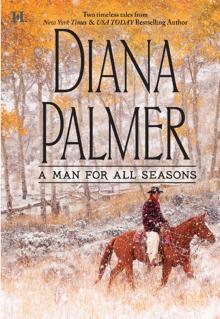 A Man for All Seasons
A Man for All Seasons Sweet Enemy
Sweet Enemy Desperado
Desperado Lacy
Lacy The Winter Man
The Winter Man Diamond Girl
Diamond Girl Man of Ice
Man of Ice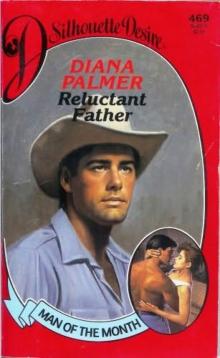 Reluctant Father
Reluctant Father Christmas with My Cowboy
Christmas with My Cowboy Love with a Long, Tall Texan
Love with a Long, Tall Texan Wyoming Bold wm-3
Wyoming Bold wm-3 King's Ransom
King's Ransom Christmas Cowboy
Christmas Cowboy Heart of Ice
Heart of Ice Fearless
Fearless Long, Tall Texans_Hank
Long, Tall Texans_Hank Unbridled
Unbridled Champagne Girl
Champagne Girl The Greatest Gift
The Greatest Gift Storm Over the Lake
Storm Over the Lake Sutton's Way
Sutton's Way Lionhearted
Lionhearted Renegade
Renegade Betrayed by Love
Betrayed by Love Dream's End
Dream's End All That Glitters
All That Glitters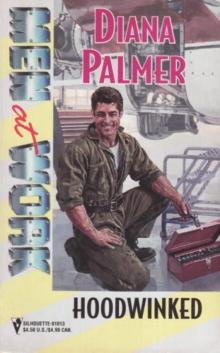 Hoodwinked
Hoodwinked Soldier of Fortune
Soldier of Fortune Rage of Passion
Rage of Passion Winter Roses
Winter Roses Rough Diamonds: Wyoming ToughDiamond in the Rough
Rough Diamonds: Wyoming ToughDiamond in the Rough Protector
Protector Emmett
Emmett True Blue
True Blue The Tender Stranger
The Tender Stranger Lone Star Winter
Lone Star Winter Man in Control
Man in Control The Rawhide Man
The Rawhide Man Untamed
Untamed Midnight Rider
Midnight Rider Trilby
Trilby A Long Tall Texan Summer
A Long Tall Texan Summer Tangled Destinies
Tangled Destinies LovePlay
LovePlay Blind Promises
Blind Promises Carrera's Bride
Carrera's Bride Calamity Mum
Calamity Mum Long, Tall Texan Legacy
Long, Tall Texan Legacy Bound by Honor
Bound by Honor Wyoming Winter--A Small-Town Christmas Romance
Wyoming Winter--A Small-Town Christmas Romance Mystery Man
Mystery Man Roomful of Roses
Roomful of Roses Defender
Defender Bound by a Promise
Bound by a Promise Paper Rose
Paper Rose If Winter Comes
If Winter Comes Circle of Gold
Circle of Gold Cattleman's Pride
Cattleman's Pride The Texas Ranger
The Texas Ranger Lady Love
Lady Love Unlikely Lover
Unlikely Lover A Man of Means
A Man of Means The Snow Man
The Snow Man The Case of the Missing Secretary
The Case of the Missing Secretary Harden
Harden Tough to Tame
Tough to Tame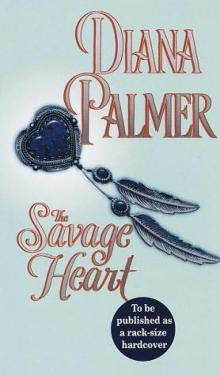 The Savage Heart
The Savage Heart